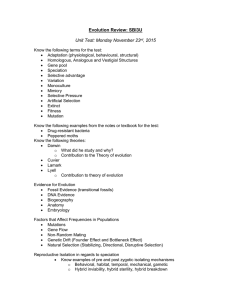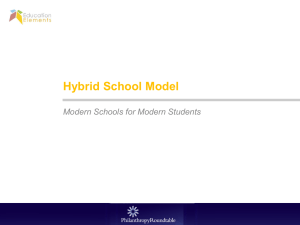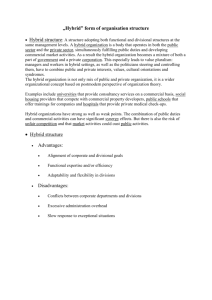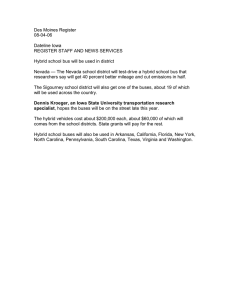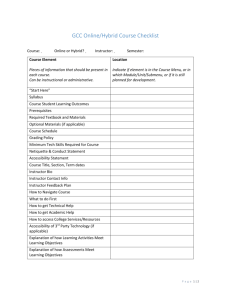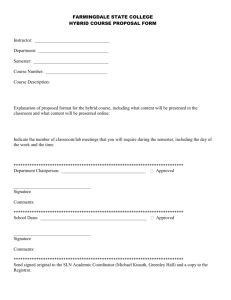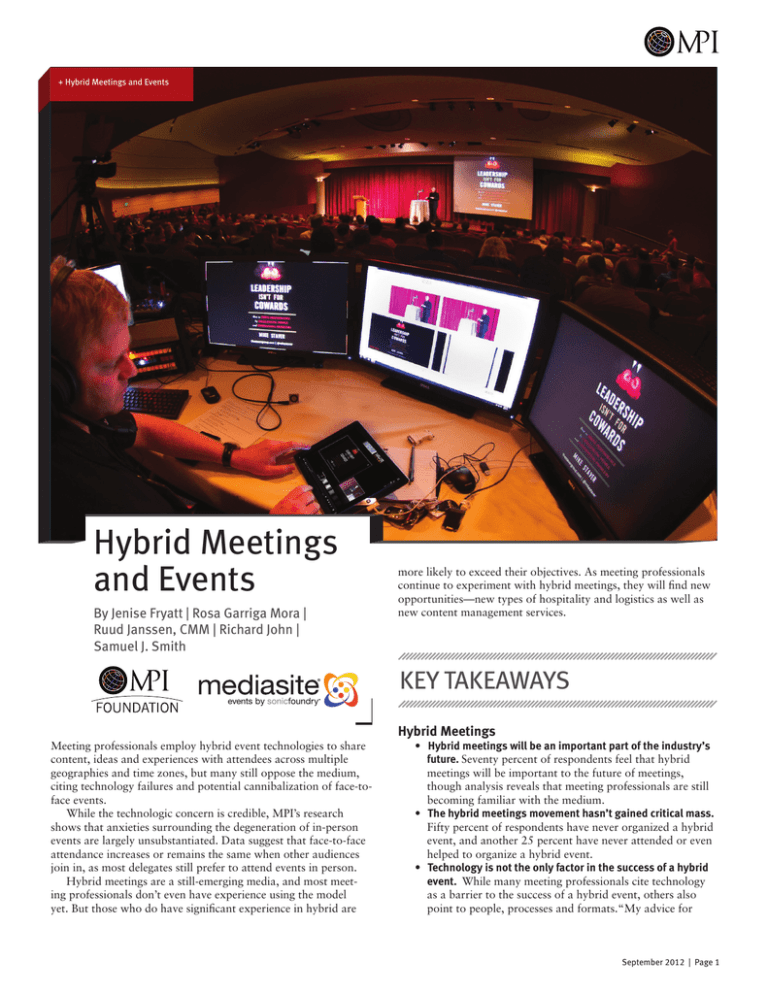
+ Hybrid Meetings and Events
Hybrid Meetings
and Events
By Jenise Fryatt | Rosa Garriga Mora |
Ruud Janssen, CMM | Richard John |
Samuel J. Smith
more likely to exceed their objectives. As meeting professionals
continue to experiment with hybrid meetings, they will find new
opportunities—new types of hospitality and logistics as well as
new content management services.
KEY TAKEAWAYS
Meeting professionals employ hybrid event technologies to share
content, ideas and experiences with attendees across multiple
geographies and time zones, but many still oppose the medium,
citing technology failures and potential cannibalization of face-toface events.
While the technologic concern is credible, MPI’s research
shows that anxieties surrounding the degeneration of in-person
events are largely unsubstantiated. Data suggest that face-to-face
attendance increases or remains the same when other audiences
join in, as most delegates still prefer to attend events in person.
Hybrid meetings are a still-emerging media, and most meeting professionals don’t even have experience using the model
yet. But those who do have significant experience in hybrid are
Hybrid Meetings
• Hybrid meetings will be an important part of the industry’s
future. Seventy percent of respondents feel that hybrid
meetings will be important to the future of meetings,
though analysis reveals that meeting professionals are still
becoming familiar with the medium.
• The hybrid meetings movement hasn’t gained critical mass.
Fifty percent of respondents have never organized a hybrid
event, and another 25 percent have never attended or even
helped to organize a hybrid event.
• Technology is not the only factor in the success of a hybrid
event. While many meeting professionals cite technology
as a barrier to the success of a hybrid event, others also
point to people, processes and formats.“My advice for
September 2012 | Page 1
•
•
•
•
•
•
meeting and event professionals is
the technology should absolutely be
the last thing that you decide on.”
—Lynn Randall, managing partner
at Randall Insights LLC
Meeting professionals who organize
hybrid events must recognize their
diverse audiences, which have different needs. Delegates at the main
venue, in remote viewing locations
and online experience the same
content in different ways. Most
meeting professionals are still trying to understand this concept.
Starting with the end in mind significantly increases the success of a
hybrid meeting. Organizations that
proactively add hybrid elements
early on generate stronger outcomes than those that add hybrid
components later in the process.
They see hybrid elements as a way
to overcome challenges in existing
live events.
Corporate social responsibility (CSR)
and sustainability aren’t considered
important factors for hybrid events.
Meeting professionals rarely use
CSR, “green” or sustainability as
justification for the increased use of
hybrid events.
Meeting professionals believe hybrid meetings are expensive. They
often raise the issue of price, which
conflicts with the potential for substantial cost savings. There are few
indications that meeting professionals are weighing total production
costs against expenditures.
Hybrid meetings require new means
of content delivery and engagement. Most meeting professionals
are unaware of advances made by
e-learning experts in increasing
virtual learning effectiveness.
Remote attendance is often
positioned negatively compared
to face-to-face attendance. The
majority of delegates participate
remotely because of a negative
driver (time, cost). Only 15 percent
say it’s a positive choice. This suggests that participating in this way
has negative connotations, that
remote attendance is in some way a
lesser experience and that marketing remote meetings fails to reflect
the needs of attendees for whom it
could be a good solution.
Hybrid Event Formats
• There are four main formats for
hybrid events. While 62 percent
of respondents indicate that their
hybrid events are simply broadcasts
to remote delegates, there are three
other types of hybrid events—those
that a) connect remote office locations to a main event, b) include
remote speakers and c) connect
multiple sites to a broadcast studio.
• There is no one-size-fits-all for hybrid events. Advances in technology have allowed meeting professionals to be creative in how they
configure an audience. SAP, Cisco,
TED and others have combined remote participation and face-to-face
experiences in many different ways.
• Hybrid events create a legacy after
the event. Fifty percent of respondents say they record conference
content for on-demand access.
Organizations recognize the value of
sharing content with people who are
unable to attend onsite. “I think a
great hybrid event leaves a ‘legacy.’
This means that information shared
and exchanged at the face-to-face
event is easy to access after the
event.” —CVB senior executive
• Meeting professionals aren’t meeting
delegate needs. Most attendees
would prefer the virtual experience
of a hybrid event to resemble a talk
show or other television format,
but most event organizers produce
hybrid events in traditional lecture
formats.
Technology Vendor Selection
• Reliable technology is a concern for
hybrid event organizers; attendees
are more concerned with compelling content. Meeting professionals
experience frustration with the
limitations of hybrid event technology. And technology is a given for
attendees, who say content and
engagement are their biggest values.
• Technology is the most expensive
hybrid budget item. Costs come in
the forms of a virtual platform, live
streaming, audiovisual production
and Internet services.
• Meeting professionals find challenges in the lack of price standards
for hybrid events. They emphasize
how challenging it is, especially the
first time, to choose vendors, who
don’t appear to offer comparable
services. Different price points
make it harder to make sense of
vendor proposals. “There are too
many vendors right now and too
many price points. The research
to find a vendor takes too long,
and some of these companies can’t
justify why they are charging such
high prices when compared to their
competitors.” —Kimberly Patterson, CTA, president of Destination
Elements LLC
• Most venues aren’t equipped to accommodate hybrid events. Meeting
professionals highlight the importance of using a venue that has
experience in staging hybrid events.
Many venues have the potential,
but lack the know-how to address
essential questions concerning connectivity and capacity.
• Hybrid meetings create challenges
in the buying process. Meeting
professionals generally source
technology and address connectivity demands early, before knowing
their exact needs, which means
that they sometimes contract with
venues and service providers that
are unable to support their needs.
Building a Hybrid Event Team
• Meeting professionals must have
both familiarity with relevant technologies and experience with hybrid events. Hybrid events are new
terrain for meeting professionals,
but there are already people and
companies with expertise. Some
meeting professionals are even
referring to other industries, such
as television, to bring proficiency
to their broadcasts.
• Professionals recognize that new
skills are required to deliver hybrid
events. They most often cite
comfort with meeting technology
and understanding the needs of
a remote audience as must-have
knowledge areas.
• Good leadership is even more
important. Because planning one
hybrid event is almost equivalent
to planning two events, meeting
professionals must put in extra
effort to coordinate staff and partners, from production to facility
managers.
• The learning curve for hybrid events
can be steep. Some organizations
take several years to fully realize
the benefits of hybrid, though they
saw some immediate advantages.
Meeting professionals receive most
of their hybrid event education
from vendors, though peer-to-peer
education can shorten the learning
curve substantially.
Designing and Preparing Content
• Not all the content presented at a
live event is suitable for remote audience. Meeting professionals with
experience creating hybrid events
say that they are adapting the
content of their face-to-face events
to the needs of the remote audience
by, for example, offering shorter
September 2012 | Page 2
•
•
•
•
sessions. Hybrid event organizers
often seek to reduce production
costs by live-streaming only the
most popular sessions. Others seek
to limit what is offered to a remote
audience as a way of encouraging
more people to attend the face-toface event.
Remote attendees prefer shorter
contents. Anecdotal data from
survey responses and e-learning
experts suggest that broadcast sessions shouldn’t be longer than 20
minutes.
The most effective hybrid events
resemble TV shows Professionals
emphasize the use of man-on-thestreet interviews and talk show and
news-desk formats as more engaging ways to deliver hybrid content
than speaker-behind-the-podium.
These formats give meeting professionals new tools to design and
deliver content.
Many professionals recognize the
need to be involved in the creation
of compelling content, but continue
to pass responsibility for content
creation to “content people.” Meeting professionals recognize the need
to be more involved in content development and delivery. However,
when asked about content decisions, many defer to content owners, who may not understand how
information needs to be presented
in a hybrid environment.
Live and remote audiences have
different needs. While hybrid
meetings are still in the early stages
of development, it’s clear that all
stakeholders need reminding that
remote audiences have different
needs, which need to be assessed
often. Because remote delegates
may miss some of the “emotional”
and “experiential” aspects of
events, meeting professionals must
search for new techniques to ensure
involvement.
Developing an Engaging User
Experience
• Compelling content is more essential than meeting professionals
realize. Delegates place far more
importance on compelling content
than meeting professionals do.
Because distractions are myriad
for virtual attendees, content needs
to be relevant and delivered in an
engaging way. “Content is what
gets people through the door,
engagement is what keeps them
there and makes them come back
for more.” —Emilie Barta, hybrid
event designer/virtual emcee
• Creating a sense of belonging is
important for remote attendees.
Meeting professionals and e-learning experts emphasize the benefit of
acknowledging the virtual audience, taking its questions and even
providing it with exclusive content.
Some successful hybrid events
are also using virtual emcees and
facilitators.
•
•
Preparing and Training Speakers
• It’s even more important to train
speakers for hybrid events than for
face-to-face Because the attention
span of remote delegates is shorter,
speakers must be more engaging.
They must acknowledge remote attendees and look at the camera. The
loss of physical connection requires
speakers to develop new skills to
engage. “The camera is your friend.
So, you’ve got to attend to that
camera, and remember there are
people with interest in your event
on the other side of it.” —Tony
Lorenz, founder of bXb Online
Cannibalization of Face-to-Face
Meetings
• Cannibalization is a myth Given
time and budget, delegates still
prefer face-to-face meetings
• But, organizations are still afraid
About 37 percent of meeting
professionals say that they face
skepticism from stakeholders who
think that hybrid will eat away at
face-to-face events, which speaks
to the need of more education and
benchmarking.
Measurement
• Meeting professionals are measuring hybrid events in the same
ways as traditional events. Metrics
include inputs (number of viewers,
social media interactions) and delegate satisfaction, which are both
easier to gather online than face-toface. However, digital event tools
allow the collection of far more indepth data that, if used effectively,
can facilitate more output-driven
metrics. “People then get stuck in
the I’m-just-doing-an-analysis-onclicks-and-views. Well, great. If
your major goal for that event was
to increase the bottom line, clicks
and views aren’t going to help you
do that.” —Dannette Veale, digital
engagements and technology strategy for Cisco
• It’s difficult to make sense of the
behavioral data provided by
•
•
platform vendors. Everything that
happens in a virtual event is registered, but it’s daunting to conduct
complex analysis on this raw data.
Marketing departments link virtual
attendees to their CRM systems for
sales analysis. Organizations combine data from their face-to-face
and virtual attendees to report on
contribution to the bottom line.
Some organizations use hybrid
meetings to comply with legal, tax
and financial reporting requirements. Some professionals see
hybrid as a solution to legislative
requirements that address access
and financial transparency. These
are powerful benefits that suppliers
are failing to effectively promote.
Key drivers include reach, engagement and repurposing. Eighty-two
percent of meeting professionals
who have hybrid experience claim
their main objective is to expand
audience reach and engagement,
and 58 percent seek “to expand
education, rebroadcast an event or
repurpose the content.”
There are disconnects among objectives and perceived costs. Ninetythree percent of professionals meet
or exceeded their objectives when
organizing hybrid events. Yet,
stakeholders still perceive a hybrid
element as being expensive.
Monetization and Revenue Models
• Meeting professionals are still trying to figure out the right revenue
model of hybrid events. Professionals traditionally charge less for
hybrid participation because they
believe that online delegates are
missing a vital element. And research indicates that event organizers are trying to determine the right
value proposition for their hybrid
meeting offerings. They are trying
different formulas, from offering
all the content for free to charging for on-demand use or event
registration.
• Meeting professionals need more
information around hybrid events
sponsorship opportunities. They
aren’t aware of the additional
sponsorship avenues that hybrid
events create. Only 18 percent believe that the virtual portion offers
new sponsorship opportunities,
and only 30 percent feel that existing sponsors will embrace the new
platform. Many others responded
“N/A.”
September 2012 | Page 3
Supported By
Mediasite Events is the trusted market leader
for conference webcasting, hybrid meetings
and video management solutions. Powered
by the patented Mediasite webcasting platform, our expert technicians
provide the highest quality webcasting experience to organizations who
seek to complement their events by streaming to viewers on any computer,
tablet or mobile device. Mediasite Events empowers meeting professionals
to reach new audiences, build instant archives of video presentations and
explore new revenue streams online. Visit http://events.sonicfoundry.com
to learn more.
TNOC | The New Objective Collective brings ideas to life
using live and digital communications. The collective is
specialized in crafting Live, Hybrid and Digital Events
and training teams to deliver them effectively. Collective contributors use
modern collaboration techniques to provide objective-based services. The
projects are managed in online collaboration spaces enabling geographically dispersed team and their supply chains from around the globe, each
with a distinct specialty, to collaborate. Whenever possible, the collective
uses open source methodologies and innovative collaboration partnerships
to consult and deliver live and digital event experiences for corporations,
associations and open source communities.
Interactive Meeting Technology, LLC is an event technology consultancy, which creates digital interactive
experiences that transform attendees into active participants. It helps clients develop a strategy around their digital initiatives.
Then, it brings their vision to life. The company works across Web, mobile,
social, digital signage and hybrid meetings.
The Meeting Support Institute is an association for companies
and individuals with products or services on the content side of
meetings, offering a wide range of tools from art to technology, AV to facilitation, knowledge to science. Its goal is to help
meeting professionals design the content side of meetings and events. The
institute informs and educates about available tools in the market via its
knowledge base, presentations, dinners and conference. Here, suppliers
meet each other and their clients.
The University of Derby Corporate is the corporate
training and development division of the University of
Derby. The school works with a wide variety of organizations to deliver work-based learning programs and accredited qualifications that improve key capabilities, such as service, innovation, leadership
and problem solving.
The Authors
MPI Staff
Jenise Fryatt
Fryatt has a background in journalism and communications and more than
20 years’ experience in the event industry as the co-owner of U.S.-based
Icon Presentations audiovisual company. An avid meeting industry blogger,
social media consultant and former community manager for Engage365.org,
Fryatt also has extensive experience leading virtual discussions, creating and
distributing content online and studying and participating in virtual-event
experiences.
Marj Atkinson, research manager
Jessie States, editor, meeting industry
Jeffrey Daigle, creative director
Ruud W. Janssen, CMM
A digital global nomad, Janssen is an online collaboration and bespoke
new media specialist for events, as well as speaker and trainer. With a solid
background in conference organizing and hospitality marketing, he has a
curiosity and appetite for slow food and fast media. Living in Basel, Switzerland, he is the founder of TNOC.ch, an unconventional marketing collective
specializing in crafting live, hybrid and virtual experiences for international,
organizations. He is also founder and curator of TEDxBasel and co-founder of
Event Camp Europe.
Richard John
As workforce development fellow at the University of Derby, John brings
academic perspective to the project. The university makes a virtual events
simulator, the eAPL (Accreditation of Prior Learning) process and a body
of research available to the team. John is also a course director for the
Chartered Institute of Marketing and a guest lecturer on events management
programs at universities in the U.K. and Germany. His articles on face-toface communication have appeared in more than 50 magazines, and he is a
regular columnist in a number of MICE magazines.
Rosa Garriga Mora
Rosa is an ROI consultant for meetings and events and serves as marketing and media manager for the Event ROI Institute. She holds a master’s
degree in international events management from Stenden University in the
Netherlands and London Metropolitan University. She is a certified meeting
architect and is editor of the book The Tweeting Meeting. She currently lives
in Barcelona, Spain, where she also works on projects related to meeting
design.
Samuel J. Smith
Smith is a thought leader, speaker and award-winning innovator on event
technology. In 2011, BizBash Magazine named him one of the most innovative people in the event industry. In 2010, Smith co-founded Event Camp
Twin Cities, an innovation lab for events that rewrote the rules for attendee
engagement in hybrid events. Smith judges the annual EIBTM Worldwide
Event Technology Watch Awards in Barcelona, Spain.
Editorial Support
Jennifer Juergens, president, JJ Communications
About the MPI Foundation
The MPI Foundation is committed to bringing vision and prosperity to the
global meeting and event community by investing in results-oriented initiatives that shape the future and bring success to the meetings and events
community. For more information, visit www.mpifoundation.org.
About MPI
Meeting Professionals International (MPI), the meeting and event industry’s
largest and most vibrant global community, helps it’s members thrive by
providing human connections to knowledge and ideas, relationships and
marketplaces. MPI membership is comprised of more than 23,000 members
belonging to 71 chapters and clubs worldwide. For additional information,
visit www.mpiweb.org.
Meeting Professionals International
Headquarters
3030 LBJ Freeway, Suite 1700
Dallas, TX 75234-2759
tel +1-972-702-3000
fax +1-972-702-3089
Europe/Africa
28, Rue Henri VII
L-1725 Luxembourg
Grand Duchy of Luxembourg
tel +352-2610-3610
fax +352-2687-6343
Middle East
PC5 Offices,
Education City,
Doha, Qatar
tel +974-454-8000
fax +974-454-8047
Canada
6519-B Mississauga Road
Mississauga, Ontario
L5N 1A6
Canada
tel +905-286-4807
fax +905-567-7191
© 2012, Meeting Professionals International. All Rights Reserved
September 2012 | Page 7

